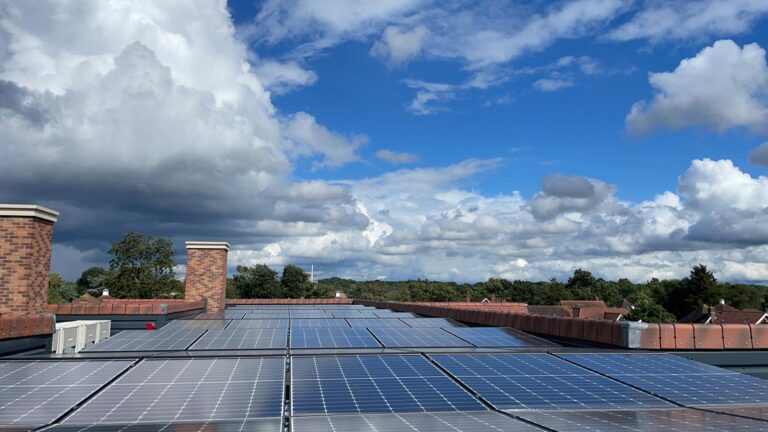Commercial Solar Panel Systems and effects of uk weather
The UK’s famously variable weather often raises questions about the effectiveness of solar panels, especially for businesses investing in renewable energy. But commercial solar panel systems are more resilient and adaptive than most people think.
While consistent sunshine may seem ideal, solar panels don’t need bright, cloudless skies to generate power efficiently. Modern photovoltaic (PV) technology is designed to harness energy even in low-light conditions, making solar a viable energy solution across the UK.

The Impact of Weather on commercial solar panel systems
Several environmental factors influence the performance of solar PV panels. The most obvious is sunlight, and more sunshine generally means more electricity. However, commercial solar panel systems also perform well during overcast days; although output is reduced, light still penetrates the clouds and reaches the panels.
For example, on a fully cloudy day, a solar panel might generate 10–25% of its typical output, which still contributes to overall savings.
Temperature also plays a role. While it’s logical to assume hot weather is beneficial, extremely high temperatures can reduce panel efficiency. Fortunately, the UK’s temperate climate enables commercial solar panel systems to operate within their optimal temperature range, particularly in spring and early autumn.
Wind and rain may seem detrimental, but they often have neutral or even positive effects. Wind can cool the Photovoltaic (PV) panels, improving performance, and rain helps clean away dirt and debris, maintaining efficiency without the need for frequent manual cleaning.
Seasonal Variations and Solar Panel Output
Across the UK, solar energy production fluctuates with the seasons, primarily due to variations in daylight hours and sun angle.
Winter:
With shorter days and low sun angles, solar panels produce less energy in the winter. Snow, though rare in many regions, can block sunlight if it accumulates. However, solar PV panels are typically tilted to allow snow to slide off quickly. The main challenge is the combination of reduced daylight hours and increased cloud cover, which can lower generation levels. Despite this, commercial solar panel systems still produce usable energy.
Summer:
Longer days and higher sun angles mean peak energy generation. In some areas, solar panels produce more energy than a business needs during summer, which is where energy storage solutions become highly valuable. Capturing this surplus energy enables businesses to utilise it during periods of low production.

How to Optimise Solar Panel Efficiency in Different Weather Conditions
To get the most from a solar investment year-round, UK businesses can adopt several strategies. One key approach is to install battery energy storage systems (BESS). These allow excess energy generated during sunny spells to be stored and used during overcast periods or at night, reducing dependence on the grid.
Regular maintenance is also crucial. Keeping solar panels free from debris, ensuring proper tilt and alignment, and using monitoring systems to track output all contribute to maximising efficiency, regardless of the weather.
Additionally, integrating smart inverters and microinverters can improve energy capture, especially on cloudy days when only part of the array is exposed to direct sunlight.
Impact of UK Weather Patterns on Commercial Solar Panel Installation Costs
While weather patterns do not directly increase solar panel installation costs, but there are a few considerations that may influence the total system cost or schedule.
For example, prolonged rainy periods or high winds can delay commercial installation projects. Installers may also need to plan for additional safety measures or equipment when working during specific times of the year, particularly in winter.
However, these challenges are well-understood in the UK solar industry, and experienced installers can mitigate delays and ensure a smooth setup process. Furthermore, businesses can still realise substantial energy savings over time, especially when systems are tailored to local conditions.
Benefits of Solar Panels in the UK Despite Weather Challenges
Despite weather-related challenges, solar panels continue to be a wise investment for UK businesses. Beyond the obvious financial savings on energy bills, commercial solar installations also reduce carbon footprints, improve sustainability credentials, and offer a hedge against future energy price increases.
Modern systems are designed to be durable and adaptable, making them highly effective even in a variable climate. In fact, many regions in the UK, particularly in the south and east, receive enough annual solar irradiation to make solar highly cost-effective over its lifespan.
With proper system setup and maintenance, commercial solar panel systems can continue to operate efficiently, even on cloudy or rainy days in the UK. Embracing solar isn’t about chasing perfect weather. It’s about recognising long-term value and resilience. Despite the unpredictable UK weather patterns, installing commercial solar panels can still lead to significant energy savings.
Visit our Commercial Solar Panels page to learn more about how they can benefit your business.
